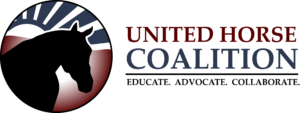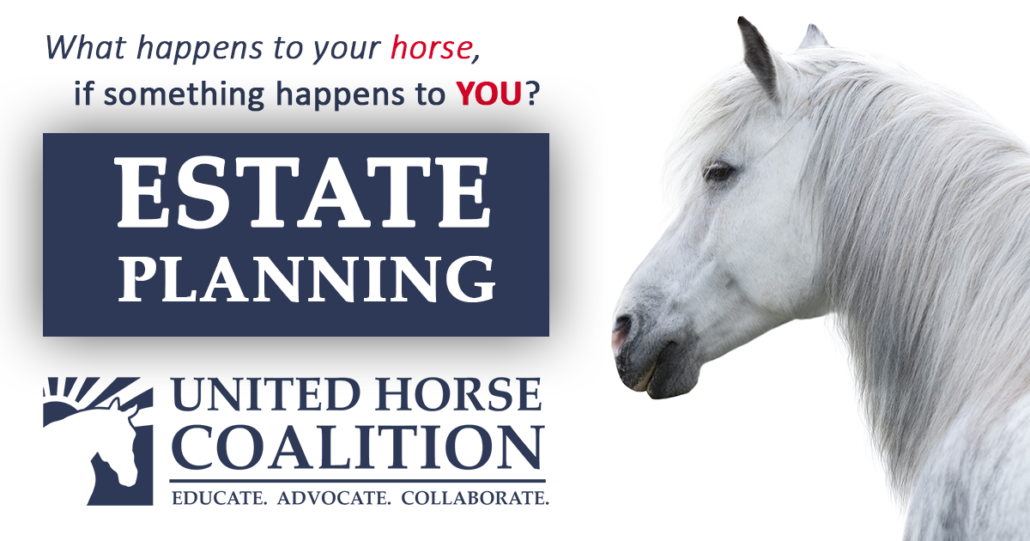Estate Planning – What Happens to Your Horse if Something Happens to You?
The following information is intended to be a general guide for estate planning as it applies to your horses. The UHC recommends contacting a knowledgeable attorney to guide you through the details of estate planning involving your equine.
While it’s common for people to regularly think about what they need to do to establish their will and ensure that their property and belongings are taken care of in the event of their death, it’s not common that their horses are included in this process. Without a will, your horse could become the property of your heirs, and these family members may have no interest, or even the required knowledge, to inherit and care for your horse.
Some owners might just elect to have their horse sold at either a private sale or a dispersal sale at an auction. However, some owners may also be wary of this as once a horse leaves an auction, its fate can sometimes be unknown and the horse may end up in the wrong hands. Additionally, horses that are retired or have special needs might be more difficult to sell or place in a good new home.
How do I protect my horses if they outlive me?
One of the first things to consider when estate planning is “Who”: Who do you know among your equine contacts, friends, or family that has the knowledge, and most importantly, the desire to care for your horse after your death? Will this person not only be able to care for the horse, but will he or she also be able to successfully sell or rehome him?
Another consideration is “How”: How does this person you have identified take ownership of your horse? Here there are two options: Naming the horse in a will; or creating a trust for the horse.
Naming the Horse in a Will
A will is a legal document that allows you to leave property to certain individuals and organizations. Many owners will take the simplest option and state in their will that the horse must be given to this specific person. Some owners even leave a bequest of a specific amount of cash or property (if the horse is stabled on the owner’s property) to help cover the costs that will be associated with the care of the horse. However, it is also important to note that a will does not automatically give your estate away the minute you die. It must go through probate, which means it is filed with the court and becomes a public document that can be seen by anyone who looks up the file. Probate can take anywhere from 9 months to several years, depending on the complexity of the estate and whether challenges arise from family members to the will. A will may also require the payment of estate taxes. In conclusion, if you haven’t made other plans for the probate period, your assets are not available to pay for the horse’s needs, such as board, feed, and farrier care, leaving your beneficiary on his or her own to incur the costs for caring for your horse.
Additional note: While probate assets are tied up during administration, the executor has a fiduciary responsibility to take care of estate assets which would include making sure that the horses that are part of the estate are cared for.
Creating a Horse Trust
A trust is a written statement that allows you to leave your estate to certain individuals or organizations. In this case, it can also explain how the horse owner wishes his horse be cared for after his death. One advantage of a trust is that funds to care for your horse are available automatically since trusts do not go through the probate period that a will does. There are two types of trusts that are available to the horse owner: testamentary and inter vivos.
Testamentary trust:
This type of trust is a trust document that is created when the horse owner passes away, as laid out in his/her Last Will and Testament. Because the establishment of a testamentary trust does not happen until death, it is by nature irrevocable.
A will may contain more than one testamentary trust, and may address all or any portion of the estate. There are typically four parties involved in a testamentary trust:
- The grantor also referred to as the settlor. This is the individual who specifies that the trust be created, usually as a part of his or her will, but it also may be set up in during the person’s lifetime.
- The trustee, whose duty is to carry out the terms of the will. He or she may be named in the will, or may be appointed by the probate court that handles the will;
- The beneficiary(s), who will receive the benefits of the trust;
- The probate court; although not a party to the trust itself, it oversees the trustee’s handling of the trust.
Inter vivos trust:
Also known as a living trust, this is a trust document created for the purpose of estate planning while the horse owner is still living. An inter vivos trust is drafted as either a revocable or irrevocable living trust, and it allows the individual for whom the document was established to access assets such as cash, investments and real estate property named in the title of the trust while he is still alive. Intervivos trusts that are revocable have more flexibility than those that are deemed irrevocable, but both types of living trusts bypass the probate process once the trust owner passes away.
It is important to note that each type of trust has its own specific considerations and should be considered in connection with any type of estate plan.
Generally speaking, in the trust, the horse owner names a trustee who will carry out your desired wishes for your horse, as well as a backup trustee should the primary trustee become incapacitated, unable to fulfill the requests in the trust, or dies. The trust also provides information and instructions on how the trust funds should be distributed for the horse’s care. Typically, the trust will dictate how the funds in the trust are to be managed, and where any remaining assets should go if the horse should also pass away (it’s also important to note that the trust terminates upon the death of the horse). The trust can contain information about anything from how the horse should be taken care of, any health issues it may have, feed/hay preferences, riding or turnout schedule, and more. The trustee will care for your horse in accordance with the guidelines set within the trust. Ideally, the individual named as trustee will either have a horse of his own or have plenty of experience in caring for horses.
Is there a benefit of establishing a trust as opposed to simply putting the horse in my will?
When trying to decide whether to create a horse trust or put your horse in your will, it’s important to consider both the pros and cons of each. However, if you intend to leave the person who will take care of your horse the necessary funds to ensure its proper care, a trust offers more structure and oversight.
Trust assets must be separated from the trustees’ personal assets, and must be used for the horse’s care as directed within the trust document. If money is given outright to the horse’s new owner upon your death, it can potentially be used by that person however they choose; there is nothing that guarantees, or holds them to, using that money for the horse’s care as intended.
A trust also allows for the succession of the horse guardian. For example, if you leave your horse to someone as a bequest in your will, and that individual dies, that person’s estate determines what happens to the horse. If the horse is left in a trust and the trustee becomes incapacitated or dies, the individual you name as a backup trustee will take over and continue care of your horse.
What about putting my horse in a retirement home?
Another vehicle that a horse owner may wish to consider when thinking about the horse’s future is a retirement home. You will need to have funds set aside for board and care, and think about what happens should your horse outlive those available funds.
Can I donate my horse?
Depending on your horse’s training and suitability, you may be able to donate your horse to a 501c3 program such as a therapeutic riding, or school program. Your donation of the horse (if accepted into a program, is considered a tax deduction for the fair value of the equine.
OTHER CONSIDERATIONS:
Registration Papers and Medical Records
In the case that your horse is registered with a breed registry, or any other registration-based organization for that matter, it’s important to ensure that all of the horse’s registration papers are in order and included with the will or trust. This will not only be helpful to the trustee when dealing with what you have left behind but will also be helpful in the case the horse is sold to a new owner. Additionally, ensuring that the horse’s medical records are in order will be helpful for both the trustee and potential new owner in becoming knowledgeable about the horse’s current and past health status and issues.
Your Belongings
We all know- horses come with a lot of “things!” So while you plan for your horse’s future, you should also consider what to do with who will inherit your belongings. It’s also important to know how much valuable items such as saddles, harnesses, or even farm maintenance equipment are worth- getting these potentially valuable items appraised will be helpful to your beneficiaries or trustees.
Your Land
It’s become increasingly common that farmland is bought up by developers to build houses, shopping centers, strip malls, and more. If you own the land that your horse was on, you may want to ensure that your property doesn’t end up being bought and turned into one of those shopping centers. One way to do this is with a conservation easement.
A conservation easement is a legally binding agreement that limits certain types of use, or prevents development on the land. Essentially, you can specify what you want your land to be used for in the future. Conservation easements can be tricky as they can potentially decrease your property value, make your land more difficult to sell when the time does come, and limit future land use potential. However, some perks include income and estate tax benefits, along with agricultural land conservation.
The Equine Land Conservation Resource (ELCR) is an excellent organization and resource for any questions you may have as it pertains to conservation easements and ensuring the security of your personal land.
Your Equine Business
If you own an equine business, you have the added challenge of determining who you want to leave in charge or what you want to happen to your business upon your death. The UHC suggests working with an attorney to help you determine and document the business’s future.
Conclusion
As previously mentioned, the UHC strongly suggests that you sit down with a knowledgeable attorney to help you figure out what is best for you and your horse’s future. The time and effort to think through and plan a complex issue like this will ensure that your equine family is taken care of after your death. In connection with the planning meeting with an attorney, it is very helpful if the horse owner were to prepare an inventory with specific information as to the equine assets owned. This would include the horse’s name, costs, date of purchase, gender, and the estimated value of the horse. The more organized the information the horse owner can provide to the attorney, the less time (and expense) the attorney will need to spend on such preparation matters.
A special thank you to Peter Ecabert, General Counsel for the National H.B.P.A., for his assistance with this guide.
Disclaimer: The UHC’s Estate Planning Guide should not be construed as, or is intended to constitute legal, financial, advisory, investment, legal, tax, accounting, regulatory, insurance, or other professional advice to you or any other party. Nothing mentioned in the Guide should be acted upon without first obtaining professional advice from a qualified professional with regard to your own objectives and needs.
All Educational Resources:
Let’s face it – we may all need a little help at one point or another.
It’s never too early to understand what assistance services are local to you.
Check out UHC’s Equine Resource Database today.















